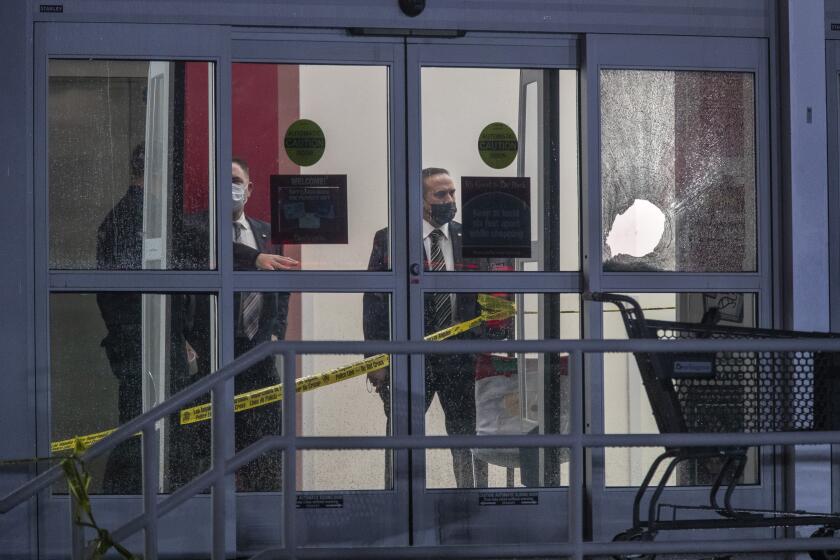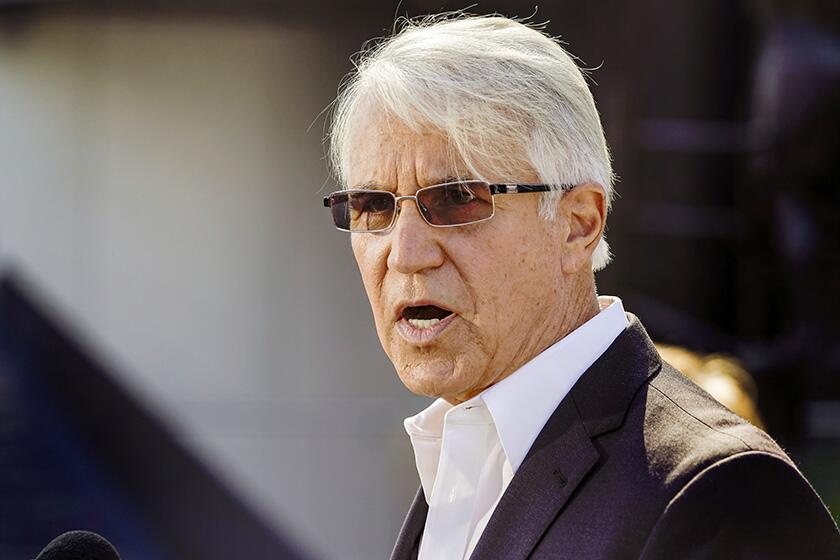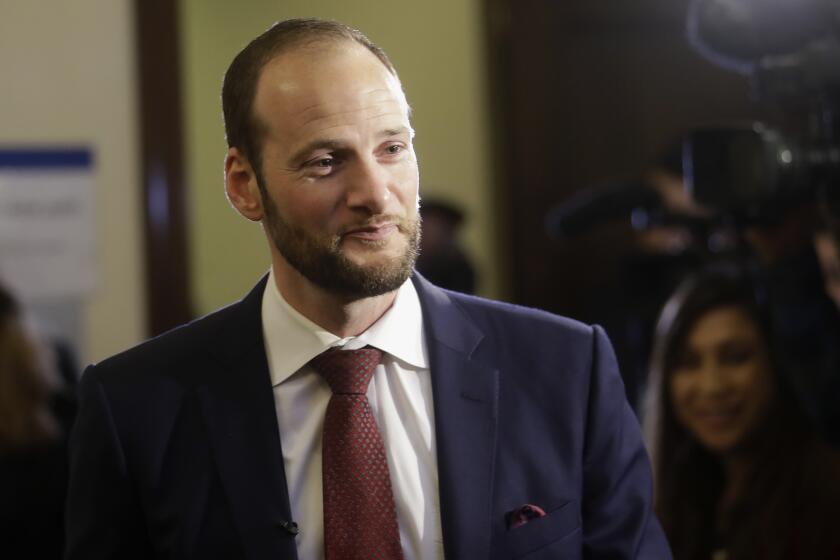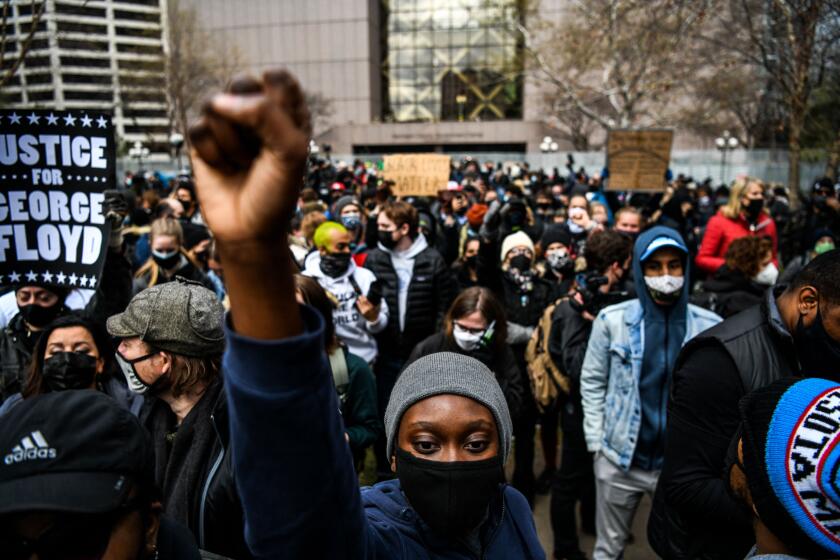19 officers in Austin, Texas, indicted over crackdown on George Floyd protests
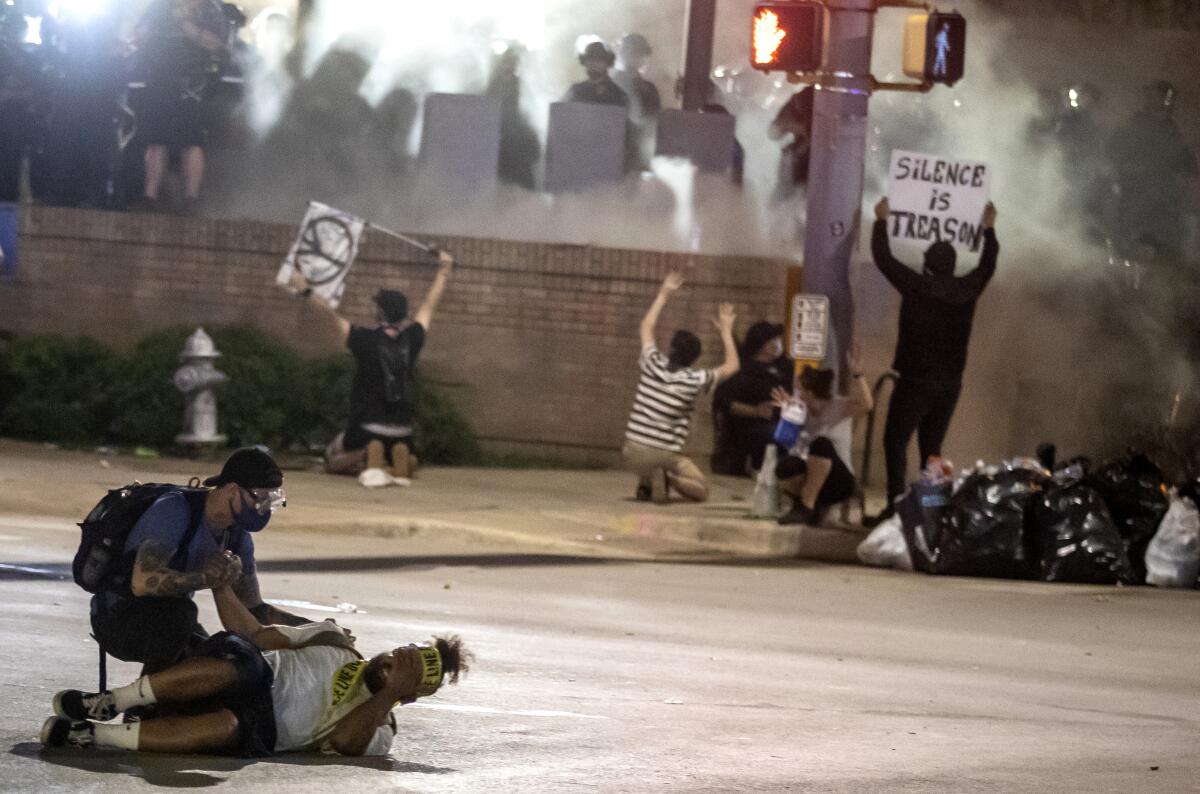
- Share via
AUSTIN, Texas — A Texas grand jury has indicted 19 Austin police officers on charges of aggravated assault with a deadly weapon for their actions during 2020 protests over racial injustice that spread nationwide after the killing of George Floyd, according to people familiar with the matter.
Multiple people spoke to the Associated Press on Thursday on condition of anonymity because they were not authorized to discuss the case publicly. Austin Police Assn. President Ken Cassidy confirmed that 19 officers are facing charges but did not have details.
The indictments are among the most for a single U.S. police department over tactics used by officers during the nationwide protests, methods that led to the resignation or ouster of several police chiefs across the country.
Word of the indictments came hours after Austin city leaders approved paying $10 million to two people injured by police in the protests, including a college student who suffered brain damage after an officer shot him with a beanbag round.
Combined, the charges and settlements amounted to Austin — conservative Texas’ liberal capital — taking some of its biggest actions as criticism still simmers over its handling of the protests, which intensified pressure on then-Police Chief Brian Manley to step down.
Jose Garza, the district attorney for Travis County, which includes Austin, spoke to journalists Thursday afternoon about the grand jury investigation but gave no specifics, including how many officers faced charges and for what alleged crimes.
A girl trying on clothes, a cop and a shocking shooting at a Burlington dressing room.
“Our community is safer when our community trusts enforcement, when it believes law enforcement follows that law and protects the people who live here,” Garza said. “There cannot be trust if there is no accountability when law enforcement breaks the law.”
Prosecutors have not identified any of the officers facing charges. Texas law requires that an indictment remain secret until an officer has been arrested. Aggravated assault with a deadly weapon, when committed by a public servant, could carry a sentence of up to life prison.
Cassidy, the president of the Austin Police Assn., called the move “devastating” for law enforcement in the city, but also said he was confident that no officer would be convicted. He criticized Garza, calling the investigation politically motivated.
“Garza ran on a platform to indict police officers and has not missed the opportunity to ruin lives and careers simply to fulfill a campaign promise,” Cassidy said.
Los Angeles County Dist. Atty. George Gascón has revised his blanket ban on trying juveniles as adults, which had drawn the ire of critics.
Garza said his office prosecutes anybody who causes harm “regardless of who causes it.”
Austin Police Chief Joseph Chacon, who took the job after Manley left, said he respected the grand jury process but was “extremely disappointed” to hear the district attorney announce anticipated indictments of his officers.
Chacon stressed that his command staff had prepared officers to face hundreds of people when thousands actually showed up at protests he described as at times “righteous and violent.”
“I am not aware of any conduct, that given the circumstances that the officers were working under, would rise to the level of a criminal violation by these officers,” Chacon said.
A database with DNA collected from victims of rape and sexual assault was searched to identify suspects in crimes, Dist. Atty. Chesa Boudin said.
But beanbag rounds fired by officers did not always perform “in the manner anticipated,” Chacon said, and his agency now prohibits the use of “less-lethal munitions in crowd-control situations.”
The settlements approved Thursday are among the largest paid to people who were injured by police across the U.S. during the massive protests that followed Floyd’s murder by a police officer in Minneapolis.
The largest of the Austin settlements gives $8 million to Justin Howell, who was 20 years old when police shot him with a beanbag round. Family members told the AP following the incident that Howell suffered a cracked skull and brain damage, leaving him in critical condition for days.
The city will also pay $2 million to Anthony Evans, who was 26 when an Austin police officer shot him with a beanbag round in a separate incident, which resulted in extensive medical treatment to his jaw.
Breaking News
Get breaking news, investigations, analysis and more signature journalism from the Los Angeles Times in your inbox.
You may occasionally receive promotional content from the Los Angeles Times.
Austin Mayor Steve Adler said the settlements “remind us of a real difficult and painful moment in our city.”
It is the latest reflection of how, two years after the protests that swept the country, cities are still addressing the injuries and tactics used by police to contain them. Earlier this month, prosecutors announced charges against two Dallas police officers accused of injuring demonstrators after firing less-lethal munitions.
After the protests in Austin, Manley said Howell was not the intended target when officers fired into a crowd following an altercation, which Howell said had involved people throwing objects at a line of officers. Authorities have said that that led to the officers firing at the mass of protesters from above.
David Frost, who captured on video the moments after Howell was shot, told the AP that he saw protesters throwing fist-sized rocks and water bottles at the line of police on an overpass. Then he saw Howell fall. The young man was bleeding heavily and went into a seizure, Frost said at the time.
The landmark case has riveted a nation wrestling with the issues of police brutality and racial injustice it raised.
The settlements are the second and third payments awarded out of a dozen lawsuits filed in Austin that have claimed injuries from the protests. Earlier this month, the Austin American-Statesman reported that a $150,000 settlement was approved for a woman named Ariana Chavez, who was shot in the head with less-lethal munition, resulting in a concussion.
At least 19 people were hospitalized in Austin after the protests.
Eleven officers were disciplined for their actions in the protests, with seven additional officers placed on administrative duty.
More to Read
Sign up for Essential California
The most important California stories and recommendations in your inbox every morning.
You may occasionally receive promotional content from the Los Angeles Times.
